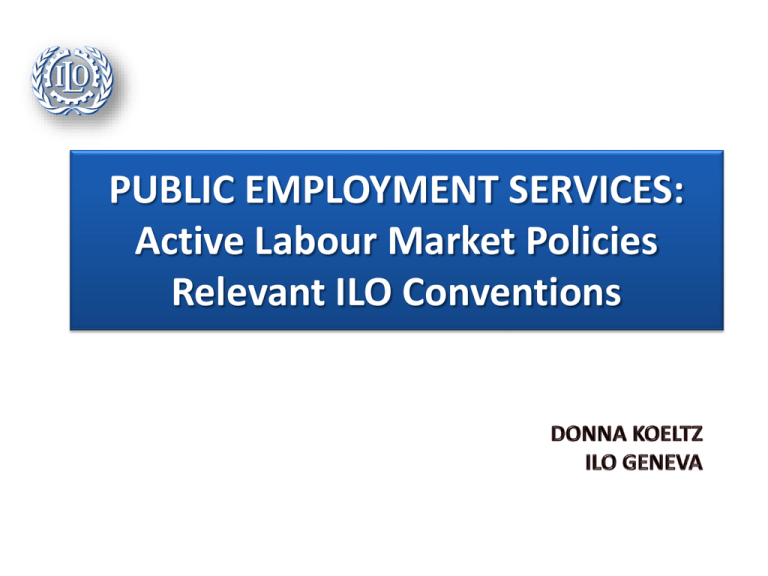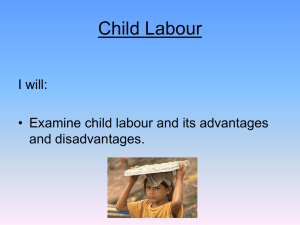PUBLIC EMPLOYMENT SERVICES: AN OVERVIEW
advertisement

PUBLIC EMPLOYMENT SERVICES: Active Labour Market Policies Relevant ILO Conventions Public Employment Services are the government institutions which plan and execute many of the labour market polices governments use to help workers enter the labour market, to facilitate labour market adjustments, and to cushion the impact of economic transitions. 88: EMPLOYMENT SERVICE CONVENTION 1948 • Ensure the maintenance of a free public employment service • Ensure the best possible organisation of the employment market • Consist of a national system of offices • Tripartite advisory committees Registering applicants for employment Obtaining precise information on vacancies from employers Facilitating mobility of job seekers Collecting, analysing and systematically making available, information on the labour market Administration of unemployment insurance and other measures Meeting the needs of special categories of applicants Initiating special measures for youth To facilitate the matching of job seekers who are looking for employment with enterprises who need workers to fill their job vacancies The Evolution of the Core Functions Job search assistance & placement services Regulatory Services Labour Market Information Employment services Administer unemployment benefits Labour Market Programmes INITIAL INTAKE • Registration • General Information on Services Provided • Access to Self-Service Options • Group Information Sessions • Individualized Counseling • Assessment and Development of a Return-To-Work Action Plan EMPLOYABILITY • May include Career, Vocational and / or Employment Counseling IMPROVEMENT • May involve one or more Labour Market Progammes • Do all clients have fair and equitable access to the services? • Are the desired outcomes being achieved? PERFORMANCE • Are both job seekers and enterprises satisfied with the services? MANAGEMENT • Are services delivered efficiently? Personal / Environmental Factors Clear Job Objective Career Counseling Assisting job seekers select an appropriate occupation Skills & Requirements to perform the job Vocational Counseling Assisting job seekers identify skills gaps and determine the most appropriate means of closing these gaps Job Search Skills Ability to maintain a job Employment Counseling Assisting job seekers to effectively promote themselves to enterprises with job vacancies Realistic Career Goal Vocational Counseling Assisting job seekers identify skills gaps and determine the most appropriate means of closing these gaps Skills training programmes Educational Upgrading On-the-job training Entrepreneurial Training & related services Job Subsidies programmes Internship programmes Employment Counseling Assisting job seekers to effectively promote themselves to enterprises with job vacancies •Employment Resource Centre •Job Matching •Job Search Techniques •Job Finding Clubs •Access to internet sites and LMI •Importance of life long learning •Developing good work habits •Life skills coaching WHO ARE THE VULNERABLE GROUPS? Women may face social / cultural taboos, need to balance family and work responsibilities Older Workers often lack current job search skills, technical skills may be outdated but in spite of this may be reluctant to consider retraining Migrant Workers face recruitment abuses, exploitation, social issues, difficulty in reintegrating when they return from overseas employment Youth are three times more likely to be unemployed than adults and young women have particularly difficulties. Persons with disabilities face problems of accessibility, societal misunderstanding regarding their abilities All of these groups may eventually become Long Term Unemployed which brings with it even more barriers. … are likely to be more successful when they are… Well targeted and tailored to meet individual needs Designed to respond to labour market requirements Linked with work experience Part of a comprehensive package of services Involving the social partners ADVANTAGES DISADVANTAGES If not carefully targeted the Can create employment if same result might have targeted to specific needs been reached without the and groups of disadvantaged programme people Can be used to compensate for initial lower productivity and/ or training Non subsidized workers may be replaced by those who are subsidized Employment may last only as long as the subsidy Can have high employment potential May meet some job seekers aspirations for flexibility and independence But Can be difficult for job seekers who lack networks, experience, technical knowledge and collateral There is also the risk of failure of the business, particularly when the overall economy is weak, which limits its capacity to create sustainable employment And… More effective when combined with financial and other services, in particular mentoring and training programmes Help job seekers gain labour market attachment May increase employability when combined with training Improves physical & social infrastructure, particularly if combined with development and sectoral strategies HOWEVER… Workers may become trapped in a spiral of temporary public works programmes Low capacity for labour market integration Often gender biased Potential displacement of private sector enterprises Lack of funds and budget constraints Capacity of Job Centres and staff Recruitment and retention of PES staff Balance & integration of main PES functions Improving accountability & cost-effectiveness and stakeholder ownership Improving use of ICT Improved LMI capacities Scope of PES or whether alternative options are better (e.g. one-stop-shop) Division of Labour between private & public employment Services Coordination of services for international migration between involved stakeholders nationally & internationally • Public Employment Services using different delivery models • Special Targeted Initiatives • Increased demand for Career Counselling • Leading to need for Better Labour Market Information • Increased interest in Skills Training • The Opportunities through Green Jobs Placement / Job Brokerage Labour Market Information Placement / Job Brokerage Placement / Job Brokerage Labour Market Information (generally limited to their sectoral specialty) Often specialized in issues related to a specific target group Some training programmes generally specific to the industry within which the PrEA specializes May offer some training, workshops or seminars on basic job search techniques, life skills etc. May provide some financial support or other services to help job seekers get started Administration of Labour Market Adjustment Programmes Administration of Unemployment Insurance Regulatory Activities The association of private employment agencies, CIETT promotes self regulation of its members. • LEGITIMACY OF PRIVATE AGENCIES • BALANCE • FLEXIBILITY • PROTECTION OF WORKERS • COMPLEMENTARITY 1. Modified Traditional (e.g. United Kingdom) Direct Delivery unemployed up to one year External providers unemployed more than one year 2. Decentralized (e.g. Philippines, China, Chile) Large Urban Areas; Outlying Areas 3. Subcontracted (e.g. Australia, Canada) 4. Latest Development (the Netherlands) When developing an Employment Policy for a country it is important to consider: • Capacity of the Public Employment Service • Core services most needed, the mix and the degree of each service • Who are the most vulnerable groups? • Who are the other stakeholders and partners? • What delivery model will work to provide the best possible service to job seekers, enterprises and the government?







